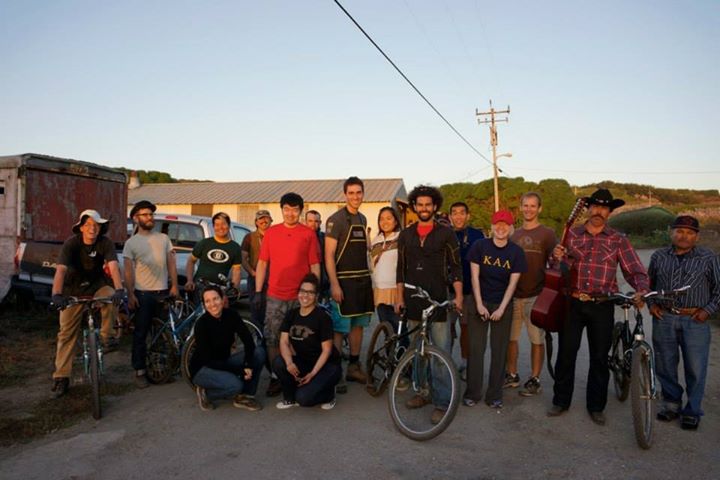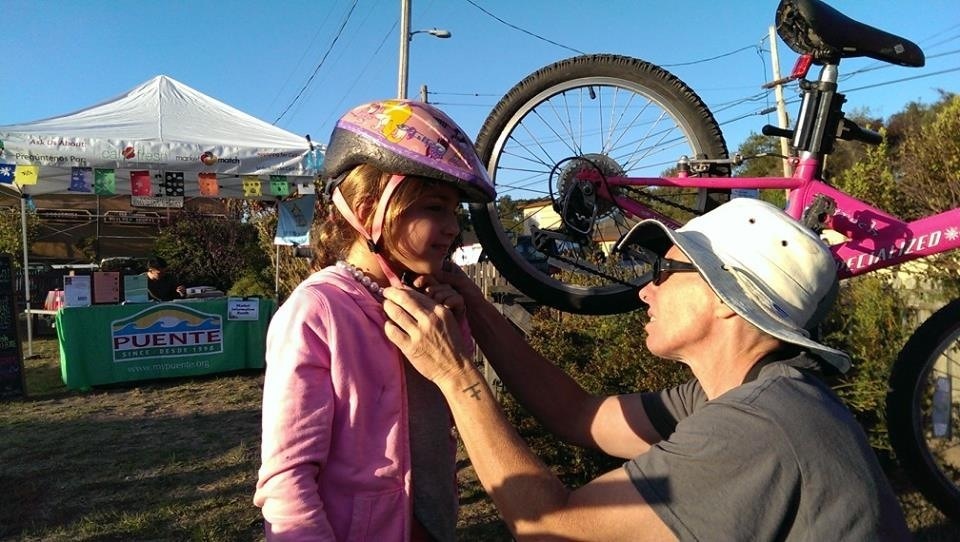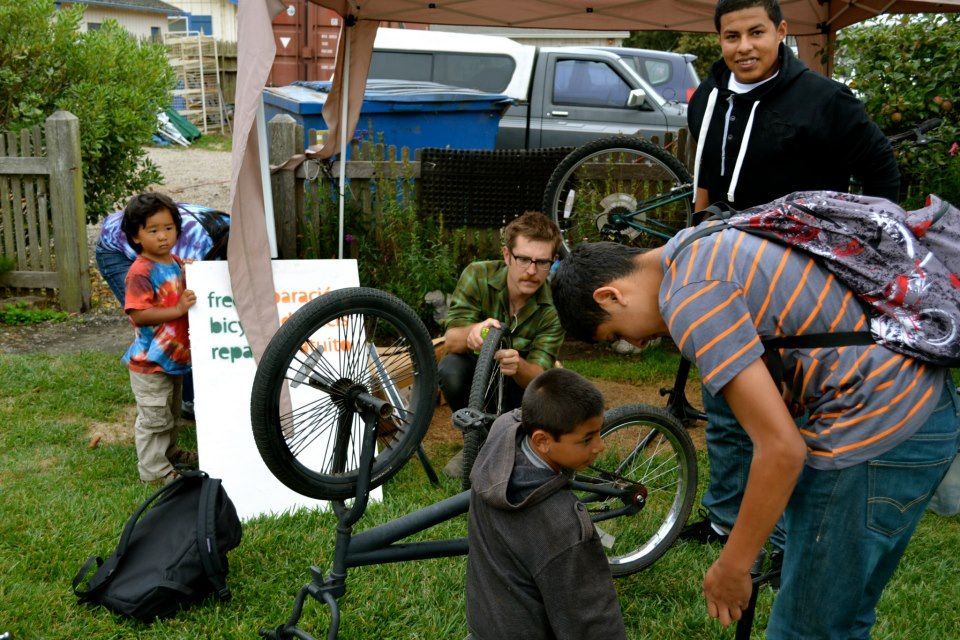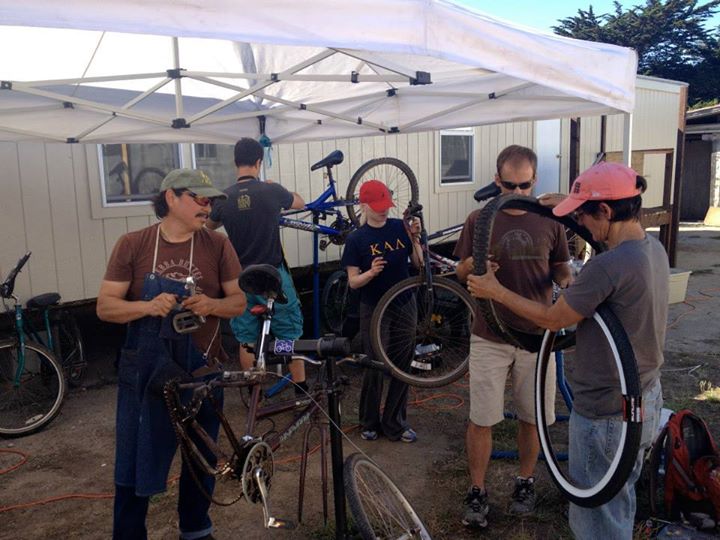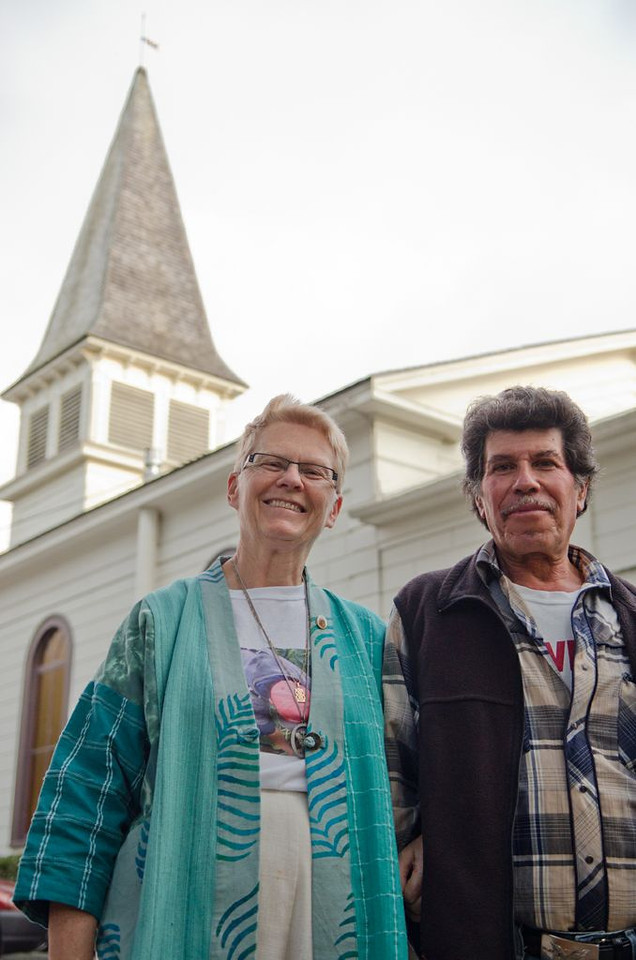A day in the life at Puente
The story of what happens at Puente on a Thursday is the story of the South Coast itself: its children, parents, farm owners and farm workers, teachers, volunteers, patients and medical staff.
On a Thursday, these participant populations overlap in real time over a dizzying six-hour period – crossing paths on the way to English as a Second Language (ESL) classes, Zumba, Story Time, La Sala, Homework Club, adult education, the medical clinic, the farmers’ market and several other events hosted and sponsored by Puente.
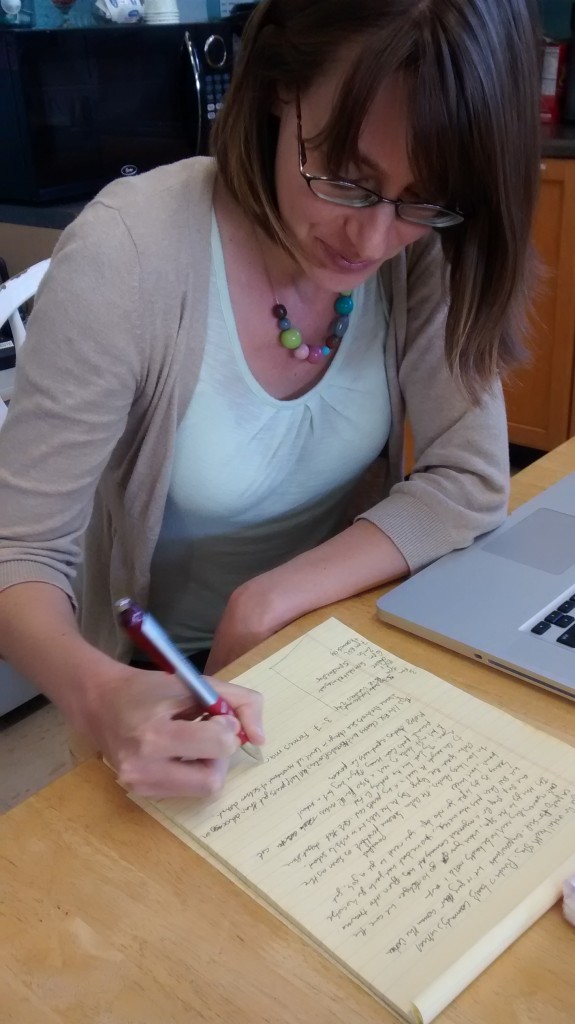
Julia Scott, who wrote this article, prepares for a full day at Puente.
It’s a magical and purposeful time and it’s all hands on deck for Puente staff, many of whom work into the evening to run programs and provide support.
“Thursday is the day when every single thing Puente does is on display. I enjoy seeing all our programs interrelating. It’s like poetry. It’s exhausting, but I love it,” says Puente Executive Director Kerry Lobel.
Here’s some of what happened on Thursday, September 3.
10:30 a.m.
Puente’s offices are hushed on a fresh, sunny morning, as if in anticipation of the day ahead. Deputy Executive Director Rita Mancera is on the phone and so is Alejandra Ortega, Puente’s Youth Program Associate. Lobel greets them both and heads off to a meeting. In the first portable, Clinical Director Joann Watkins and Mental Health Intern Celia Gagnon work at their computers. Program participants have arrived for a variety of appointments: immigration, behavioral health counseling, health coverage enrollments, and more.
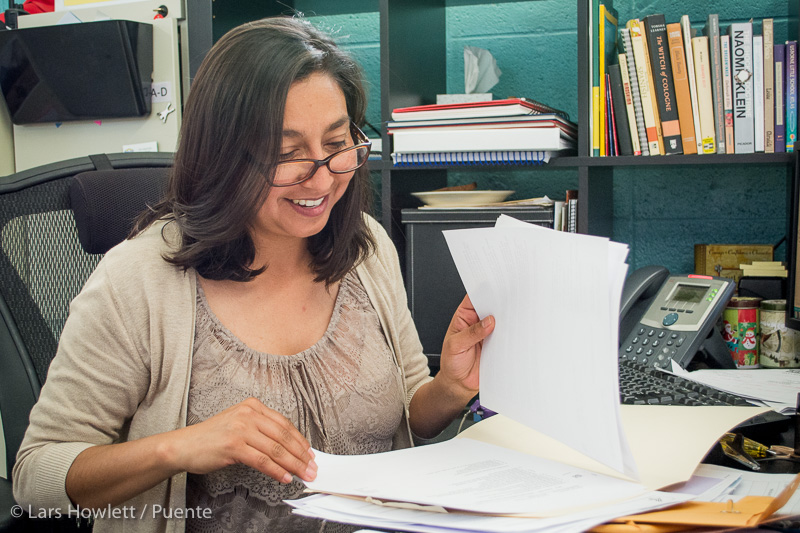
Mancera at work at Puente.
1:30 p.m.
Abby Mohaupt, Puente’s Faith Community Liaison and Volunteer Coordinator, is doing two art-related activities at once: waiting for a chalkboard to dry so she can hand-draw the sign for Puente’s farmers’ market which starts at 3 p.m. and opening bags of bright plastic beads and pipe cleaners to construct an example of a caterpillar. It’s the theme of tonight’s Homework Club, which Mohaupt will coordinate with Ivan Ortega from 7-9 p.m.
“We’re reading ‘The Very Hungry Caterpillar’ today and then we’re going to make caterpillars and paint butterflies. We’ll talk about how caterpillars become butterflies, combining ecology and art,” she explains.
2:00 p.m.
Today’s farmers’ market vendors are setting up their booths in the grassy courtyard next to the Pescadero Country Store. Nichole Mikaelian, Community Supported Agriculture (CSA) manager for Blue House Farm (and Puente’s former market manager), pulls up in her white truck and unloads crates of green beans, red and yellow cherry tomatoes, and strawberries that glisten like jewels in the sunshine.
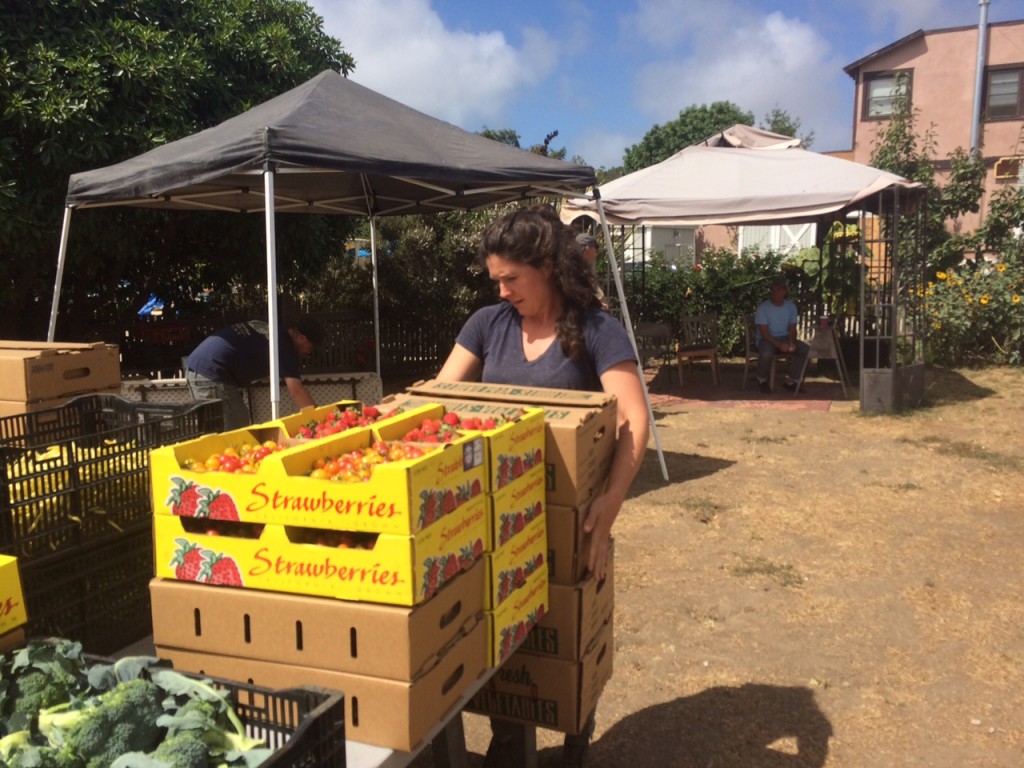
Nichole Mikaelian unloads vegetables at the market.
Charlea Binford, the Farmers’ Market Manager, takes a break from setting up the Puente booth with Ivan Ortega to make a phone call. “Can you bring a power strip? I forgot to get ours,” she asks someone back at the office. The wind is picking up. Binford and Ortega drop weights on ground to steady the tent. This will be the beginning of a long afternoon and evening for Binford who wears many hats.
3:30 p.m.
Puente is suddenly filled with vegetables – not from the farmers’ market, but from Potrero Nuevo Farm in Half Moon Bay. The farm gives most of its organic produce away to local nonprofits for free. On Thursdays, Puente board member Wendy Wardwell brings Puente’s share to the childcare area to give to the men and women who participate in Thursday evening classes and events — La Sala and Zumba. It’s another way Puente gets fresh, healthy produce onto the plates of local families who grow the food but can’t always afford it.
Today’s harvest includes leeks, broccoli, basil, squash, tomatoes, rainbow chard, green peppers and stalks of celery. Wardwell starts sorting the food into bags with help from Jovany Rios and Osvaldo Nabor, two Pescadero High School students who work with Puente. “Not everyone’s going to get kale today. Everyone’s going to get peppers, though,” she says, surveying the piles.
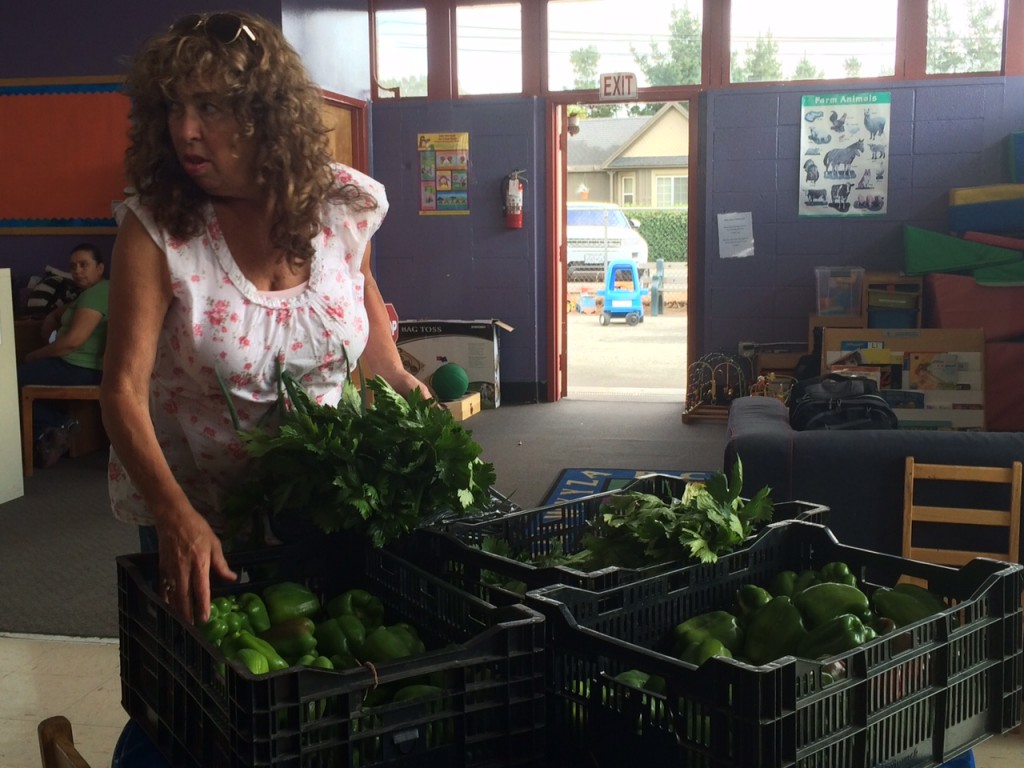
Wendy Wardwell surveys vegetables from Potraro Nuevo.
Office manager Veronica Ortega picks up a sprig of fragrant basil and places it in a mug with some water, which she puts on her desk. “I love that smell,” she says, giving it a sniff.
4:00 p.m.
Puente’s second portable becomes a pop-up medical clinic on Thursday nights, staffed by a 5-member team from San Mateo Medical Center’s Coastside Clinic in Half Moon Bay. They ready patients’ medical charts on computers and prep the exam room, blood drawing station, supply carts and EKG machine. The clinic is expecting six patients tonight between 5 and 7 p.m.
“We’ve got one new patient physical. The others are hospital discharge follow-ups, medication follow-ups. One has shoulder pain,” says Connie Mendez, one of the county team members.
Puente’s safety net team is ready to enroll participants in the health coverage programs for which they are eligible.
4:45 p.m.
Participants have started to arrive for the evening’s busiest period. A family of father, mother and two daughters laughs together as they improvise a volleyball game in front of Puente’s offices. Other children climb on the jungle gym.
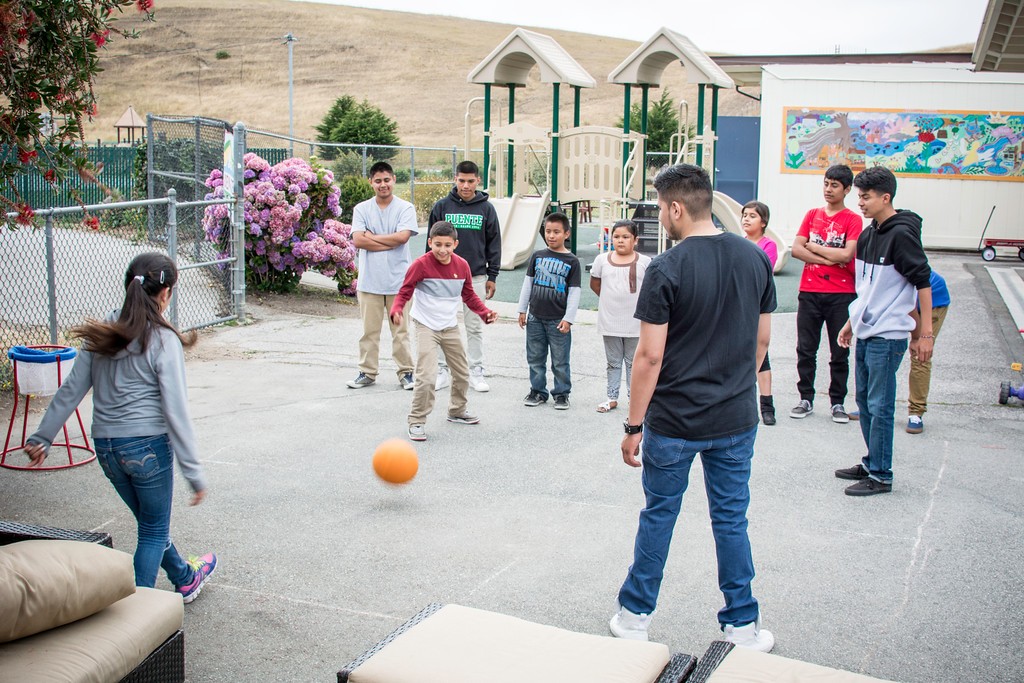
A familiar sight on Thursdays: children playing together outside the Puente office.
4:50 p.m.
The farmers’ market, now in its fifth year, is booming, with 152 visitors so far this afternoon. Shoppers flock to the market stands while local resident Shari Sollars brings her bicycle over to Puente’s Bike Booth for a diagnosis. Every, the bike mechanic on duty, puts the bike up on the rack and discovers a flat almost immediately.
“Your tires are shot. Even though you have tread, the side walls are basically baked,” she diagnoses. Sollars thanks her. “I don’t know anywhere else I can come and get my bike tuned for free,” she says.
5:15 p.m.
Nine ESL students listen avidly as Charlea Binford (who also teachers ESL classes at Puente) stands at the head of Puente’s classroom and teaches them vocabulary words. This is the first of four ESL classes Puente will host back-to-back tonight. And Binford will teach two of them. She will also be teaching a continuing education course for Mexican nationals called Plaza Comunitaria – all before 9 p.m. She left the farmers’ market early to get here.
“To have to teach three classes, plus manage the farmers’ market, is a lot,” she says. “But I love it.”
5:45 p.m.
With ESL classes in session and Puente’s childcare program in full swing, Rita Mancera finds a quiet corner to host a meeting for three local volunteers who want to mentor Pescadero High School students this year. Puente’s mentors form close relationships with their high school mentees, helping them pull their grades up so they can aspire to college.
“There are about 100 students in the high school right now and 16 of them, who worked for Puente this summer, are in critical need of a mentor or tutor. This year we’re going to start with nine of them, so we need more volunteers,” Mancera tells the group.
6:30 p.m.
It’s hard to miss the sound of Puente’s Thursday night Zumba class in the multipurpose room of Pescadero Elementary School. Instructor Lisa Sumano leads 22 strong and sweating women in a series of aerobic dances to hot salsa beats. Puente’s twice-weekly Zumba classes are by donation, and the volunteer instructors take their classes seriously and love them so much that they are informally known as the ‘Zumba queens.’ The women smile back at Sumano as she leads them in one energetic song after another.

Participants at a recent Zumba class.
6:45 p.m.
Puente’s front offices have been repurposed by a handful of students using staff desks to get their schoolwork done and reading to each other in pairs. Many students on the South Coast lack any space to do their homework in their family’s small homes so, for a little while, Puente becomes a quiet haven for schoolwork.
7:15 p.m.
As the sun sets over Pescadero, Puente takes on a hivelike atmosphere and every room is full. The childcare area has been converted into one of three ESL classes now happening simultaneously. ESL classes are divided into three levels. In Puente’s Learning Center (a classroom in a portable in back), Karen Walker leads her Level 3 class in a comprehension-based exercise where they interview each other in pairs and then give the answers in English. The question: what do you like to do?
“I like to dance,” says a male student. His female conversation partner says she also likes to dance, but searches for a way to express a term in English that’s on the tip of her tongue. “How do you say, I have two left feet?” she asks. It turns out to be the same expression in both Spanish and English. Everybody laughs.
8:00 p.m.
The MV Transportation bus is making the rounds, transporting students to Puente and back home again. On Thursday nights, Puente hosts La Sala at the Pescadero Community Church, and MV shuttles the farm workers home at the end of the evening.
La Sala is Puente’s longest continuously running program, a social space geared toward single male laborers who are far from home. Puente volunteers serve food and the men talk, laugh and play music together.
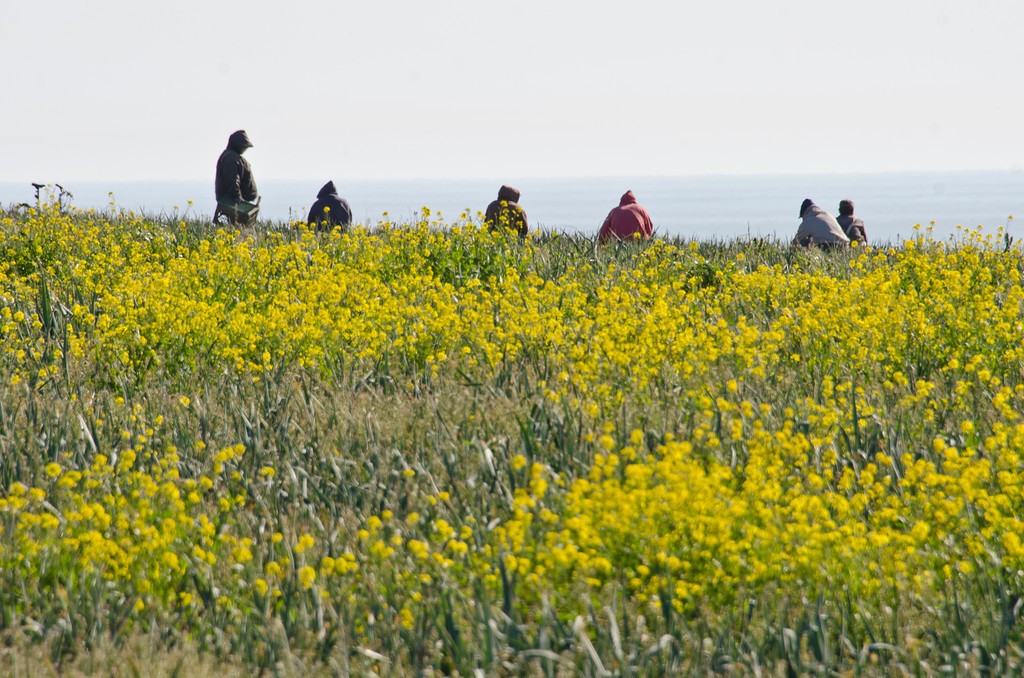
Another familiar sight around Pescadero: workers in the field.
Three of Puente’s largest expenses include the costs of transporting participants to La Sala, Story Time, ESL and its many other weekday activities, childcare for all programs, and food and snacks for program participants who would otherwise have to skip a meal to attend classes.
8:15 p.m.
In the multi-purpose room, tables and art supplies have replaced Zumba dancers. A dozen children are in Homework Club tonight while their parents take ESL classes. The elementary and middle school students have finished reading ‘The Very Hungry Caterpillar’ and have thoroughly enjoyed constructing their own caterpillars out of beads and pipe cleaners. They also painted butterflies, and can explain the butterfly life cycle.
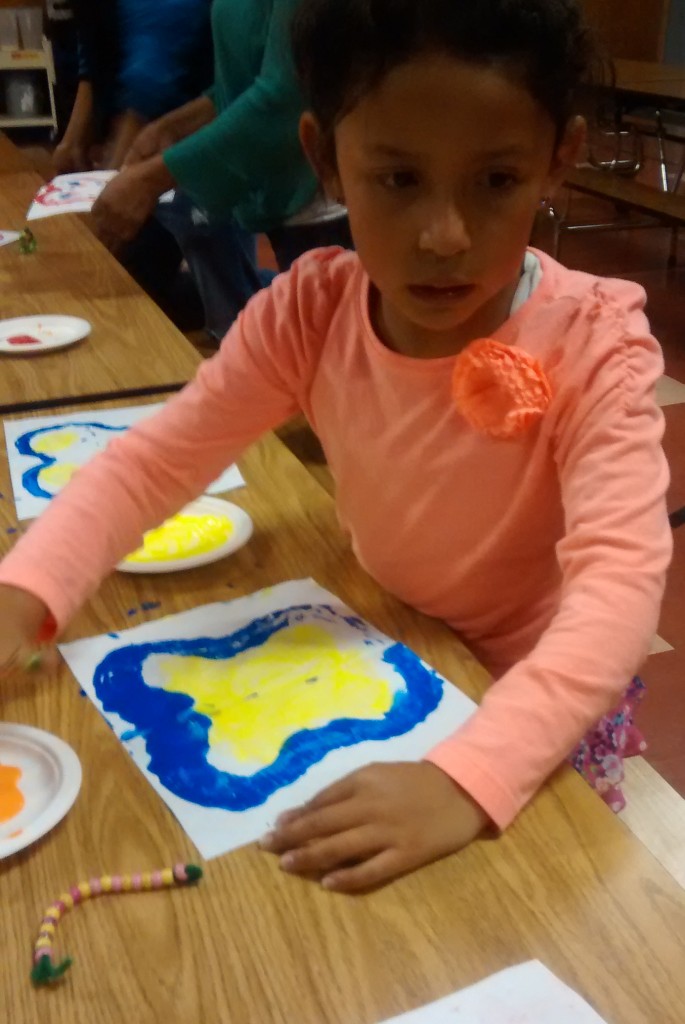
Kimberly with her butterfly and caterpillar before snack time at Homework Club.
Now it’s snack time. Part of the meal involves ‘ants on a log’ – celery sticks topped with peanut butter and raisins. The kids also make their own caterpillars out of grapes speared on toothpicks.
“We’re playing with our food today, and I feel great about it,” says Mohaupt, surveying the children. When the kids finish their meal, they jump up to start reading or doing math exercises with Puente staff and high school students doing community service.
9:00pm
Puente staff begin to put away tables and vaccuum the childcare area as students of all ages head home. Another full and wonderful day is done.
Puente farmers’ market reaches peak deliciousness – and attendance
At Puente’s farmers’ market last week, the only thing you couldn’t eat was on the back of a bicycle, getting mixed in a pedal-powered blender.
“Usually we make smoothies with it, but I thought, why not make paper pulp?” said Mona Urbina. The Youth Program Coordinator for Pie Ranch hit upon the imaginative idea when she was looking around for a fun and enriching way to engage children at Puente’s weekly farmers’ market, Pescadero Grown. So Urbina made “seed bombs” with the kids seated around a picnic bench. After taking turns pedaling the blender, the children took the paper pulp to a cloth-lined strainer and mixed in some seeds. Then they squeezed and strained water out from the admixture and pressed it into a rubber ice cube tray of heart shaped molds. They also made round ones out of compost and clay, adding water and the seeds of cosmos flowers.
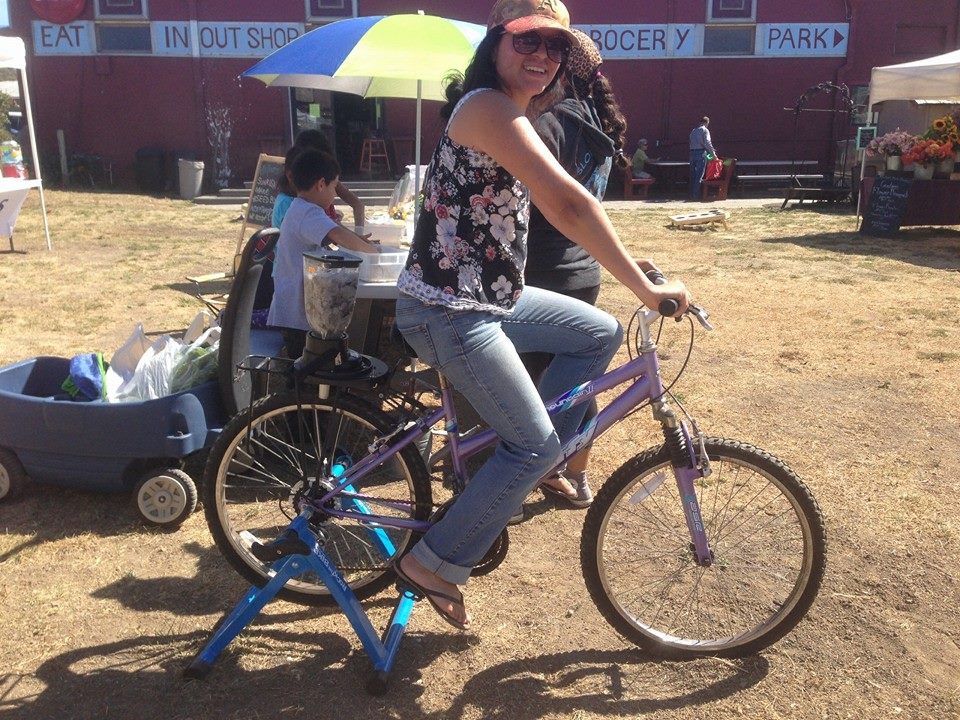
Mona Urbina shows off the blender bike at the market.
“Can I pour the water?” asked Samara, 4, while her mother Allegra Turner shopped for strawberries, chard and other produce to bring home for her family.
“We’re here at least once a month. I’m really into fresh produce, and this is super fresh. The kids’ crafts are really great, too,” said the La Honda mom, inclining toward Samara and her friend, who ran off to play with the beanbag toss after they finished their flower experiment.
The children left the market with the delicate seed bombs clutched in their small palms and instructions from Urbina. “We’re going to let this dry, and when it rains, we’re going to throw it out into a field. The sun will help it grow into a flower plant,” she told them.
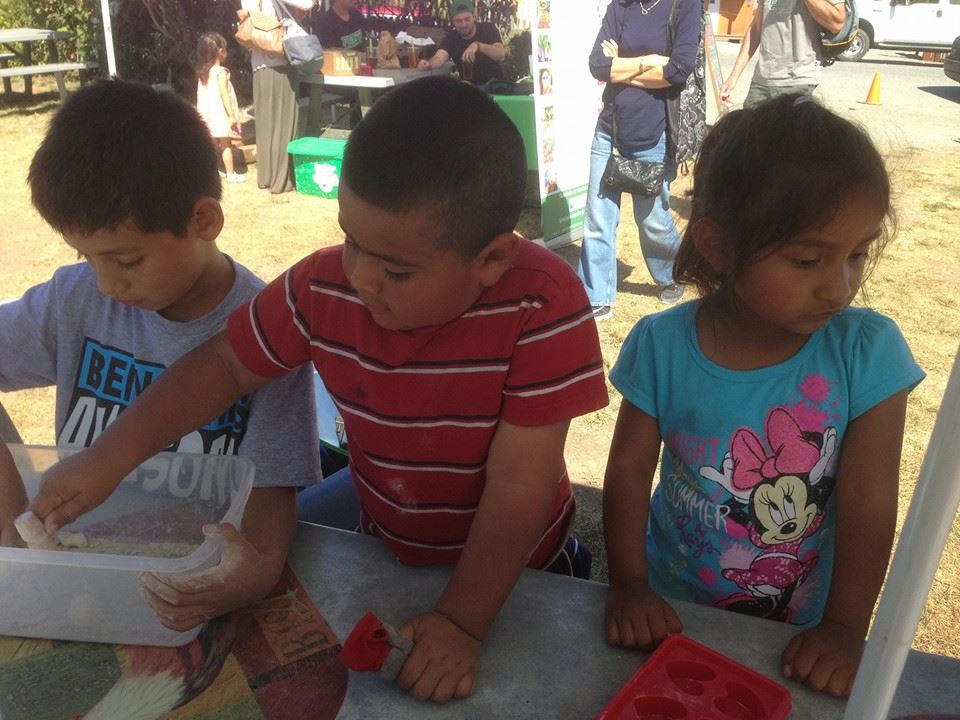
Children making seed bombs together.
The message was no accident. To visit the Pescadero Farmers’ Market is to make the connection with nature that consumers skate over at supermarkets, and to do so in a community setting.
It’s not just any honey for sale – it’s State Street Honey and the owner, Todd Parsons, is on hand to describe the process of raising his own queen bees. Due to excellent sales at the Pescadero market this year and a few other retailers, he has almost sold out.
Everything has a story. The Early Girl tomatoes – they’re the result of dry farming, which concentrates all the sweetness of the fruit with a minimum of watering. Two Pescadero farms, Blue House and Fly Girl, have perfected the technique, and their farmers describe it as you reach a bright red tomato, pleasing to the eye and sticky to the touch.
In addition to its seasonal offering and CSA, Pie Ranch leads children’s activities once a month at the Pescadero market, always inspired by its mission of food education and food justice. The Half Moon Bay library comes twice a month with art and science projects for the kids. And Puente recruits volunteers who have ideas for fun and stimulating group activities, like screen-printing.
Now in its fifth summer, Puente’s farmers’ market is at the halfway point in a bountiful season that has spanned everything from apples, leeks, summer squash, heirloom tomatoes and Brussels sprouts to sunflowers, dahlias, potatoes, locally caught fish, and grass-fed beef from local producers Markegard Family Grass-Fed and LeftCoast GrassFed. Up next in the weeks to come: peak eggplant, peppers and melons, yielding to a fall harvest of parsnips and sweet potatoes.
“This season has been great for us so far. Our tomatoes and Padrones have been booming. Some things come into season later here on the coast, like melons, which we’ll have soon,” explained Kaila Clark, marketeer for Fly Girl Farm.
Puente founded the Pescadero Grown! Farmers’ Market as a nonprofit venture with three central goals: to boost food sales for local farmers; to get fresh, affordable, healthy food onto the plates of local residents, including low-income ones; and to establish a community crossroads for people of white and Latino backgrounds to mingle, bring their kids, dance to live music, and learn about important social services available through Puente and its nonprofit partners.
The market’s principal funders are San Mateo County, TomKat Charitable Trust, and the Peninsula Open Space Trust.
It is the sort of place you might run into your high school teacher choosing a bundle of kale or bringing their bicycle for a fix-it appointment at Puente’s Bike Booth, one of the market’s most popular attractions.
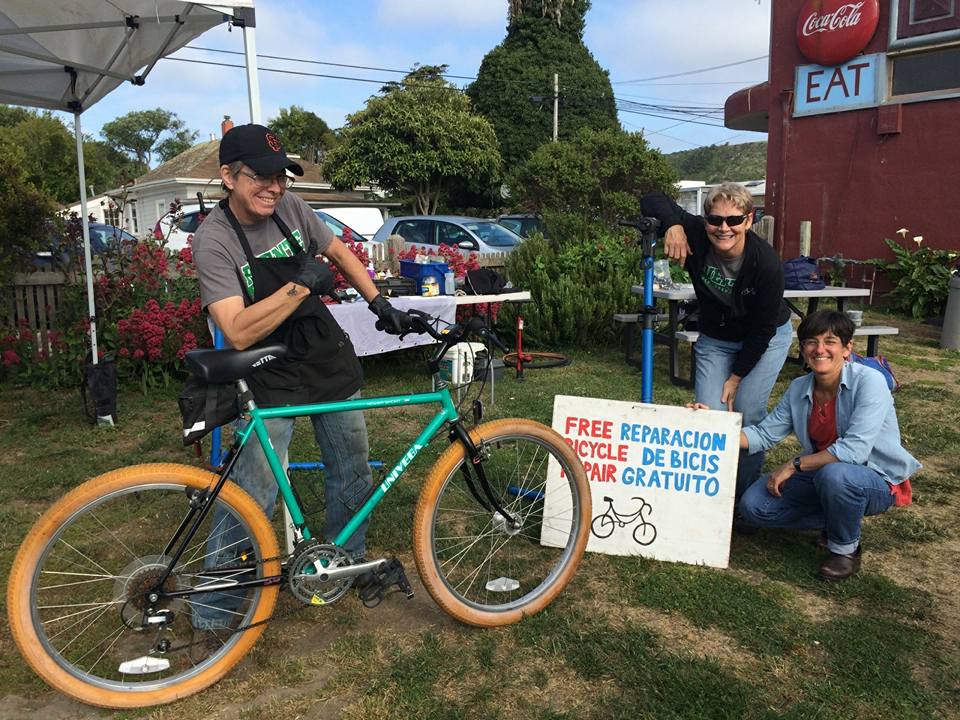
Every, Rosemarie, and Liz are a few of the people who support bike repair at the market.
Market Manager Charana Binford surveyed a late August market with a satisfied expression.
“I’m so happy with how the market turned out this year,” she said. “It feels more and more like a communal area to enjoy. And toward the later hours you see kids coming and running around and climbing the trees and playing with the hula hoops.”
It’s tremendously appealing, and it has found its audience. The word for this year’s market has been “more”: more music, more vendors (including one who sells handmade driftwood art), more kids’ activities, and more shoppers than ever buying from local farmers.
“There was one day in July where we had 500 people come through here in one afternoon,” marveled Binford. “That was a record.”
An especially good sign: a record number of qualifying shoppers are also using Puente’s discount Pescadero Tokens program to double their food purchases, now worth up to $20 for every $20 they want to spend, according to Binford.
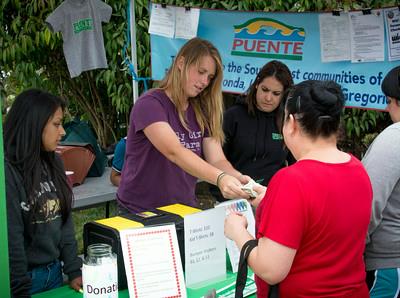
Charlea Binford assists a member of the community with receiving Pescadero Grown Tokens.
“I have more people than ever coming to use the tokens consistently,” she confirmed. The market is the only place in Pescadero where shoppers can use nutrition discount programs like WIC and CalFresh.
And it may be the only farmers’ market with a stand set up by a dental practice. Dirk Alvarado, Executive Director of Sonrisas Community Dental Center in Half Moon Bay, handed out toothbrushes, floss and other goodies to shoppers and children while reminding them to take care of their teeth. The nonprofit dental clinic has partnered with Puente to serve local farm workers and their families.
“People have a natural fear of the dentist, and we’re here to make that less scary,” said Alvarado.
Even the beats were mellow: a mix of hip-hop and oldies, curated by local DJ Anti Dope. Farmageddon owner Chuck Harper caught the vibe. “It’s good here. We try to help out. It’s not all about making money – otherwise, we wouldn’t be here. It’s more about hanging out and being a part of the community,” he said.
Catch Pescadero Grown on Thursdays from 3-7 p.m. at the Pescadero Country Store, 251 Stage Road. As per tradition, this year’s market will end on a high note October 29 with a Dia de Los Muertos (Day of the Dead) celebration that includes a community altar. For details, visit http://pescaderogrown.org/

